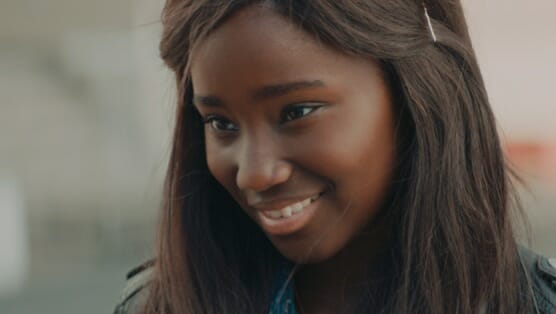Girlhood

It seems too easy to label the French film Girlhood as a coming-of-age drama, like a companion piece to Richard Linklater’s Boyhood (it’s not). Nor is it simply a glimpse into the workings of a girl gang, although that’s a slightly better translation of its original title, Bande de Filles. The labeling would be unfair because Girlhood is both—and so much more.
Written and directed by Céline Sciamma, the film examines feminine identity in the context of modern French society. It spotlights women of color who inherit a set of preconceived identities, responsibilities and restrictions all because of a second X chromosome, and focuses, in particular, on one young girl’s struggle to change her given lot in life. It’s a theme that resonates far beyond French borders.
Girlhood’s opening immediately brings gender issues front and center: A football team emerges from a stadium tunnel to a pulsing, electronic soundtrack by Para One. The scene is already disorienting as they’re playing American football in France, but as the action unfolds in a slow-motion sequence, the audience realizes that most of the players in uniforms, pads and helmets are black teenage girls and young women. It’s an odd sequence, given that the only “football” reference in the rest of the film is the FIFA 13 soccer video game played by several characters. Symbolically, however, the mix of competition and camaraderie exhibited on the gridiron is representative of the rest of Sciamma’s film.
As the girls return home to their working-class neighborhood just outside of Paris, presumably from the football match, Marieme (Karidja Touré) and her friends are subject to ogling and catcalls from the boys hanging in the plaza. At 16, the soft-spoken Marieme already displays a maturity beyond her years. She takes on a matriarchal role at home as she cares for her two younger sisters while their mother works nights cleaning offices. She also stays clear of her tyrannical older brother Djibril (Cyril Mendy), who leads the neighborhood’s street gang. The boys and men in the film are also trapped within societal restrictions, though they’re mostly as protectors and providers, who resort to violence to maintain the existing power structure.
The lack of authority figures in Marieme’s and her friends’ lives is evident—even ones who are supposed to help instead discourage any sort of growth. A turning point in her life occurs when a guidance counselor tells Marieme that because of her grades, vo-tech and not high school is in her future. Marieme tells the counselor that she desperately wants to pursue an education: “I want to be like others. Normal.” The counselor’s response is devastating: “It’s a little late for that.”
-

-

-

-

-

-

-

-

-

-

-

-

-

-

-

-

-

-

-

-

-

-

-

-

-

-

-

-

-

-

-

-

-

-

-

-

-

-

-

-








































